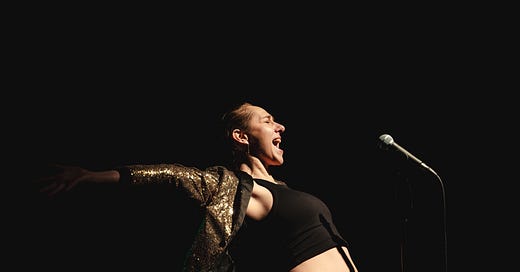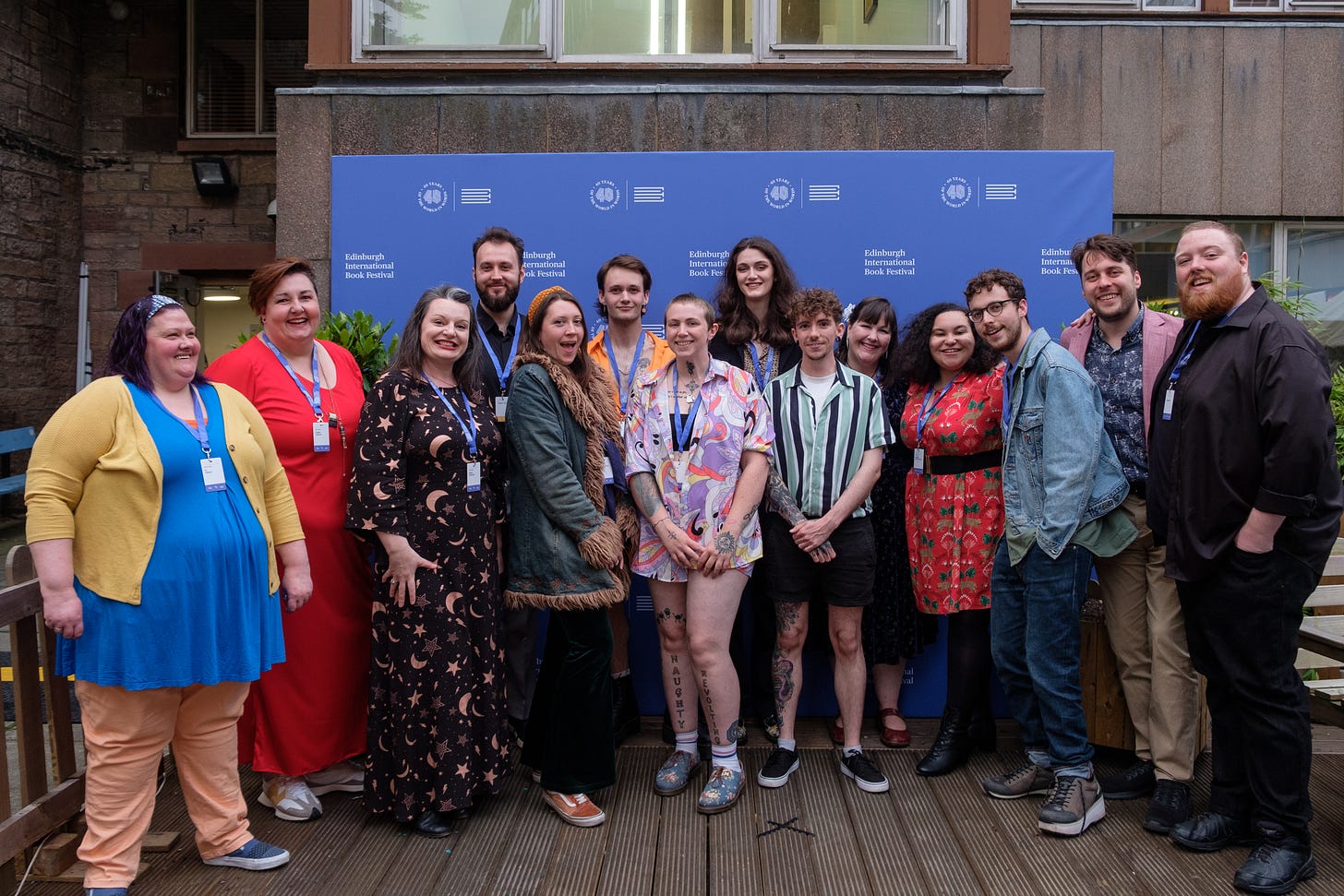Eat your heart out, Rabbie Burns. There are new stars in town.
From 'slams' to cellar bar recitals, meet the performers making poetry cool again in Edinburgh
Tonight, Edinburgh will be positively reeking of haggis, and ringing with hearty cries of “Fair fa’ your honest, sonsie face…!” Even the most tim’rous of us can be found spouting rhymes as we celebrate our National Bard on Burns night.
But for the other 11 months of the year, it seems poetry is the reserve of the few literary buffs who, against all the odds, survived high school English classes without an enduring hatred for similes and sibilance and stanzas (remind me which one is which?). I was surprised to find that, nearly 250 years after Rabbie himself lived in Edinburgh, the city continues to inspire poetry - but nothing like the kind we were forced to study in school.
Amused then enraged
In December I went to the Loud Poets open-mic night in the Canon’s Gait, put on fortnightly by I Am Loud Productions. “I’m here for the um.. poetry?” I asked awkwardly at the bar, and was directed downstairs to a small cellar room reminiscent of a Fringe venue. Folding chairs were squeezed into rows, with a single microphone on a tiny stage in the corner. My only prior experience of poetry was sweating over higher English essays about war poems, or the yearly terror of primary school Burns recitals. So as the host strode to the front of the room I had no idea what to expect.
What followed was actually closer to the intimacy and comedy of Burns suppers with friends, than the high-brow and intimidating evening that the phrase “poetry performance” inspired in me. Folks from all walks of life, amateur and professional, performed their poems. Some made me laugh out loud with rhyming double-entendres, and others had me holding my breath, stunned as they described exactly how I had felt a few months or years ago. One of the amateur performers, Erin Bushe, who writes poetry on the side of her career as a doctor, left me truly riled up using rhythm and repetition to describe the ceaseless cat-calling that we women constantly endure.
An explosion of verse
Poetry in Edinburgh has seen something of a revival in the last 20 years. In 2002, Stewart Conn became the city’s first Makar - our own poet laureate, whose title in Scots means “one who fashions, constructs, produces, prepares.” Two years later, Edinburgh became the first UNESCO City of Literature. More recently, the poetry-focused Push the Boat Out festival has been added to the Edinburgh festival calendar.
Dr. Katie Ailes, a professional poet and one of the directors of I am Loud, explains there has been an evolution in recent years, with the growth of spoken word poetry where the performance is the finished product more than the written words. Spoken word is all over Edinburgh now - you can attend competitive poetry slams, curated poetry gigs, or even try it out yourself at open mics across the city. Poets are being commissioned to produce content for music festivals and distilleries, and Len Pennie is Scotland’s very own TikTok poet, with over 1.2 million followers across her social media platforms. The current Edinburgh Makar, Hannah Lavery, is just one of many creatives producing poetic films and combining dance and verse.
As old as the Odyssey
Ailes, who has a doctorate in British Spoken Word performance, sees this development as both new and ancient at the same time. “Oral poetics… is as old as Homer and the Odyssey” she says. “This is how people used to tell stories and how they used to share art and communicate before literacy was widespread.” While literary trends have differed across cultures, in most cases it’s only in the last few centuries that written poetry has been seen as the superior art form. Ailes points out that Robert Burns’ work, which were often songs as well as poems, also fitted into this intersection of written and spoken poetry.
Ailes explains to me how the spoken word poetry we see today emerged in the late 90s and early 2000s, following the rise of slam poetry in the US. She describes Scottish spoken word as a “beautiful melting pot” of influences from American Beat generation poets, British cabaret tradition and more ancient Celtic bardic traditions.
Among all of the UK’s cities, Edinburgh’s literary heritage and contemporary festival culture make it, in Ailes opinion, uniquely inspiring for writers. As an American who decided to move to Scotland permanently because of the poetry community she had found during a study abroad programme in Edinburgh, she knows the city’s allure very well. “To know that [Edinburgh] has this incredibly deep and rich history of poetry and literature and key writers living here and writing here, that’s really empowering.” Besides the household names of Robert Louis Stevenson and Alexander McCall Smith, the Building Stories podcast Ailes hosted for Edinburgh City of Literature showcases five historic female writers who were connected to Edinburgh.
“The fact that Edinburgh is a festival city… plays in our favour” Ailes also says. She describes the buzz and inspiration that comes from the sheer concentration of writing talent in Edinburgh in August, and tells me that the Fringe hosted many of Loud Poets first shows, which they then toured all over the UK and beyond. The Edinburgh International Book festival has also provided a platform for Loud Poets events, such as the Grand Slam Final of their 2023 national poetry slam tournament, which sold out a 360-seat theatre.
During the rest of the year, Ailes says there has “clearly been a hunger” for poetry performance in Edinburgh over the last decade. In February 2014, Loud Poets hosted their first ever spoken word poetry event, and immediately packed out a 180-seat venue. I Am Loud now organises regular Loud Poets events and provides regular resources to spoken word poets across Scotland. They aim to support emerging talent, and to encourage as many people as possible to try poetry: “we put on showcases for professional level and emerging artists, but it’s really important to support the newer generations, not only younger people but anyone new to writing… we work to make it a really welcome space… where people can try out whatever they’re working on and feel supported in that.”
Don’t mention the ‘p’ word…
But Ailes says that there’s still plenty of work to do convincing folks that poetry is interesting and relevant - she says they avoid using the word “poetry” at all when publicising their fringe show. “One thing that turns people off poetry in school is that it can be people speaking about things that don’t relate to you, in language you don’t use,” she says. In fact, most of the founding members of Loud Poets, who are now devoting large chunks of their time and careers to poetry, discovered their passion for verse in their adult lives, via other art forms such as stand-up comedy or music. Ailes believes the problem is lack of exposure to contemporary poetry.
“When we think of poetry often we think of people like Burns, we think of Shakespeare, we think of Wilfred Owen. We think of poets of the past, in a way that we don't think about music. You don’t only think about Beethoven and Bach, you think about Dua Lipa and Taylor Swift. We recognise with music that it's a living tradition, but we don't so much with poetry, and I think a lot of that is just people not seeing the living poets today.
“Poetry is an art form like any other, it can be archaic and decrepit and uninteresting or it can be vibrant and accessible and thrumming with life. It just depends on what you see.”
Furthermore, poetry is proving to be a key tool for revitalising Scots, Gaelic and Doric across Scotland. Loud Poets events in the North and West see many performers using their own languages, and Ailes believes this makes their poetry more appealing to local audiences. Len Pennie’s most popular content has been her Scots word of the day, and she’ll be releasing her book of Scots “Poyums” later this year. The New Scots Scriever, nominated by the National Library for Scotland to promote the Scots language, is Susi Briggs, a spoken word poet (amongst other things).
So perhaps alongside the Address to a Haggis this year, why not find yourself a modern Scots poyum to read with your friends too? Even better, why not head to a spoken word event in February, and listen or have a go yourself.
If you’re not sure where to start, watch a slam at Lost in Leith, try an open mic at the Canon’s Gait, the Musselburgh hotpot, Summerhall or Typewronger bookshop (to name a few), or look out for new written poetry at Edinburgh’s independent bookshops like Lighthouse Books, Typewronger and Argonaut. Finally, if the January storms leave you not even wanting to leave your sofa, the I Am Loud youtube archive has hours of spoken word - you could start with Katie Ailes piece, about a visa renewal, and how to pronounce Tesco…
If you enjoyed this long read, you might also like some of our other features, including Many Ways to Fall in Love in a Bookshop, The Music Street Which Helps Shape the Stars of Tomorrow and The Fast Show: The Dramatic Rise of Edinburgh’s Film Industry.









